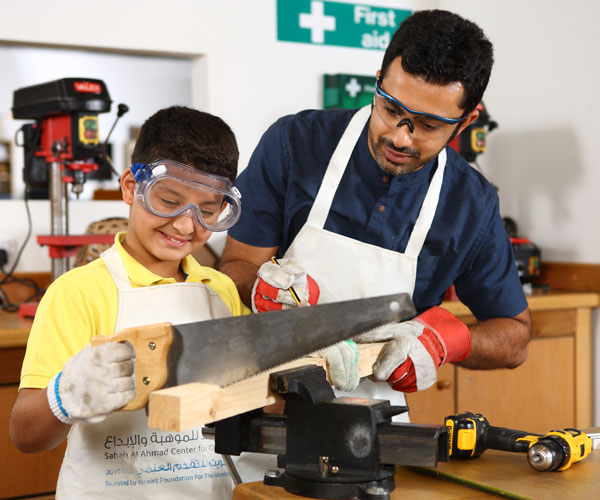
Ibrahim Al Khashti is remarkably bright young man with an ambitious vision for his future: Born in 2005, he aims to become a surgeon, or perhaps a clinical project manager.
His potential was recognized early – when he was just 9 – by the Sabah Al Ahmad Center for Giftedness and Creativity (SACGC), an affiliate of the Kuwait Foundation for the Advancement of Sciences (KFAS).
The centre offers a selected elite of Kuwaiti youngsters aged 11-18 – or even younger – the opportunity to follow a full-immersion programme, with dynamic training to sharpen problem-solving abilities, increase decision-making and communication skills, and develop their minds.
"I'm very optimistic and I hold great expectations for my future," Ibrahim said, showing a strong and positive feeling towards his position as an adult in Kuwait's society. Attending SACGC, in fact, provides the unique chance to shape not only one's future but the nation's as well, under close guidance of top experts in education.
Under SACGC's guidance, "gifted students receive intensive training," explained Abdullah Alsauid, a manager in the giftedness department at the Center. "Here they are encouraged to test their thoughts and transform them into tangible innovations."
SACGC has developed an integrated system to detect young talented minds, based on internal standards as well as international criteria. Merit comes first, because this young elite is seen as the foundation for future development.
"The Gifted Programme’s ultimate goal is to build up the community of future scientists," remarked Alsauid, who acts as SACGC specialist in gifted and talented education. "The programme takes the students to university level, trying to anticipate their potential role in the Kuwaiti Society in the area of industry, entrepreneurship, politics and other fields."
The selection phase at SACGC flows through a collaborative agreement with the Ministry of Education, which drafts a list of students who achieve 95% and above in science and mathematics at fifth grade. Students chosen for the programme enrol as sixth graders.
The idea of a center for gifted students was conceived in 1999, when KFAS established the Kuwait Office for Inventor Supports to encourage inventors to develop, innovate and protect their intellectual property.
SACGC was established in May 2010 by initiative of His Highness the Amir Sheikh Sabah Al-Ahmad Al-Sabah, Chairman of the Kuwait Foundation for the Advancement of Sciences (KFAS). It supports the goals identified in Kuwait's 2030 Vision and Strategic Plan.
Students enrolled at SACGC – about 80-90 each year – continue to live with their parents. During the day they follow intensive curricula planned by the Ministry of Education, learning to develop critical and creative thinking, problem-solving abilities, exploration and decision-making skills. Morning classes include science, mathematics, computers, Arabic and English, and are enriched with other scientific courses and field trips.
During evening classes, students follow applied science workshops, and receive a varied training in activities such as ceramics art, robotics, and 3-D printing. They are also assisted by sociologists and psychiatrists skilled in gifted students' education who improve their abilities, communication techniques and self-confidence.
Under a 2015 agreement with the International Technology and Engineering Educators Association agreement, 172 students in grades 6, 7 and 8 received a special programme in science and mathematics. And the same time, 60 teachers received training in how to make the programme a reality. In addition, there are special programmes with prestigious US research centres such as Purdue University and Johns Hopkins University.
The centre's success is evident in the steady increase in the number of students: 15 in 2012, 80 in 2016 and 305 today – 138 boys and 167 girls. Even at their young ages, students at the centre have won patents for their inventions. In 2015, SACGC has evaluated 137 ideas for potential new inventions.
Abdulridha Al Saffar, for example, has devised a subsurface irrigation system for farms and sport fields. The system, now patented, uses a complex network of pipes and channels ensuring that 90% of water in a pipeline is used for irrigation.
Other examples of Kuwaiti excellence: a surgical needle-holder invented by Hassan Al-Shammri, which helps surgeons to move the needle in narrow areas; the "bee house" devised by Fahad Al-Azmi, which uses smart architecture to protect bees from high temperatures; and a "thermal breathing bed", a cradle invented by Sulalman Al-Khattat, mimicking the mother's breathing and body temperature while playing music to calm the baby.
"Our students are able to represent Kuwait in global events. Many of them won universal prizes in Smart Brain Competitions, and represented SACGC, KFAS and the State of Kuwait in events abroad," concluded Alsauid. "We seek to create a generation able of bringing advancement in society and a brighter future to Kuwait."
Cristina Serra

